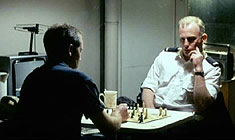|
|
|
|
My
Name is Joe
|
 |
|
For many years after his debut in the '60s, Ken Loach was fond of including in his films a pointed, unmissable sermon about the sad fate of the working classes. Raining Stones (1993) presents a typical case: in the middle of a mostly raucous and compassionate story, the intent of which is perfectly clear, Loach has a Left-wing spokesperson deliver a dour speech about everything that keeps the workers oppressed: TV, smooth talking politicians, doctors, lawyers, rigid family values, corrupt and compromised unions ... Loach's political message has never really changed: he is still driven to righteous anger by the conditions that keep ordinary folk in their miserable, lowly places. But in his more recent and best films – particularly Land and Freedom (1995) and Carla's Song (1996) – the form of the drama has changed, loosened up considerably. It is a welcome development for which writer Paul Laverty deserves some credit. The finger-wagging, holier-than-thou sermons have been dropped, as the films get more inside the daily struggles and joys of the characters. Loach has now embraced modes of storytelling that he may once have disdained, or treated with a certain critical distance because of their bourgeois individualist taint: namely, romance and melodrama. My Name is Joe continues this remarkably rich period in Loach's career. The relationship between housepainter Joe (Peter Mullan) and health worker Sarah (Louise Goodall) begins almost like a Hollywood romance: they dislike each other intensely at first, because of the difference in their social status and values. As they negotiate their burgeoning union with good humour and mutual understanding, difficult aspects of Joe's past are revealed: his alcoholism, and an incident where he once beat a girlfriend. Like Duvall's The Apostle (1997) and the New Zealand social drama What Becomes of the Broken Hearted? (1999), this is partly a story of a man who must face – and then somehow transcend – the Original Sin of male violence. Meanwhile, the other passion in Joe's life – his coaching of a local football team – catalyses another storyline centring on young Liam (David McKay), whose sorry problems reveal a swag of other addictions and temptations to which the modern working class is prey: drugs and petty criminal involvements. Never has Loach captured with such fierce poignancy and pathos the co-existence of a vicious cycle of sadness, deprivation and self-oppression on the one hand, and moments of sheer, utopian release, hope and self-renewal on the other. Loach's gradual mastery of his art and craft over three decades has gone largely unnoticed and unheralded by critics. Yet it is he, not the overrated Mike Leigh, who deserves the comparison with John Cassavetes. Both Loach and Cassavetes create a sense of lived spontaneity within tightly scripted scenes; both use generic conventions while brilliantly avoiding or overturning sentimental clichés and facile resolutions. The ending of My Name is Joe, in particular, is a brilliant testament to such heartfelt tact and ingenuity. MORE Loach: Ae Fond Kiss, Sweet Sixteen, The Navigators © Adrian Martin August 1999 |
![]()